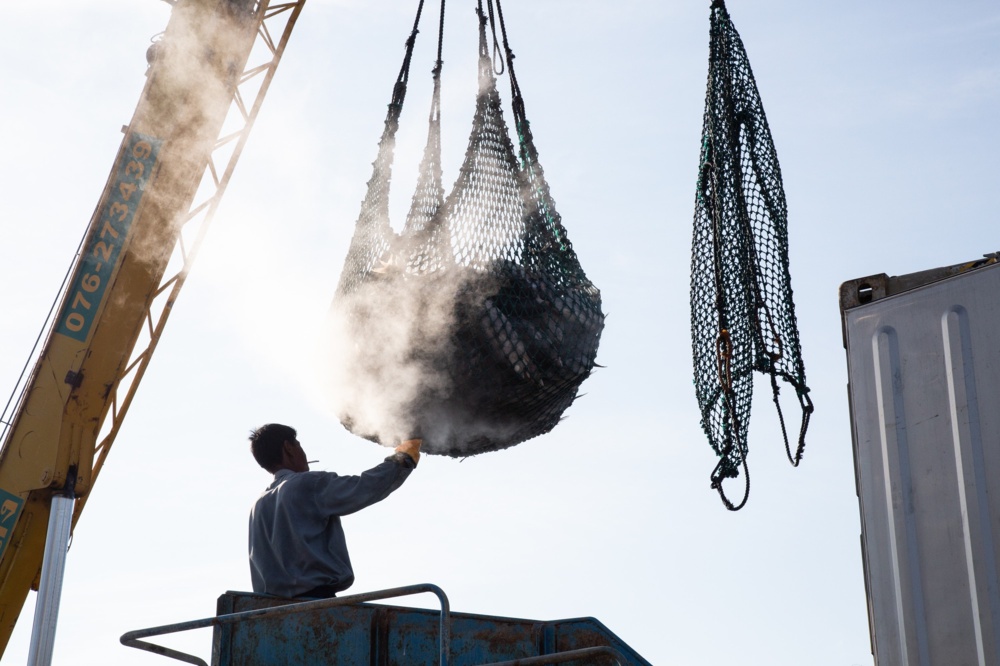
Weak fisheries certification leaves an open door for human rights abuses
The FISH Standard for Crew, a standard designed by the fishing industry for the fishing industry, purports to be able to stop human rights abuses at sea. It will do no such thing. It is voluntary, ineffective and incomplete, and only serves to block real, effective measures. Retailers and brands must avoid it, and a mandatory, transparent and comprehensive standard should be introduced.
28 organisations, including EJF, have released a statement highlighting the problems with the latest fishing industry standard for preventing human rights abuses at sea. This standard, the FISH Standard for Crew, will fail in its stated purpose and leave fishers vulnerable to exploitation and abuse.
The most glaring problem is that the FISH standard is completely voluntary for vessel owners, operators and seafood companies. This means that vessel owners who disagree with certain aspects of the standard can simply opt out and be no worse off. Voluntary commitments have failed and upholding human rights and dignity must be non-negotiable.
Only mandatory vessel standards at the national level or flag state level can truly begin to create positive changes in living and working conditions. Without legally binding, enforceable legislation to protect fishers and observers, the horrific abuse seen on board many vessels will continue.
Companies, countries and governments which import seafood have a responsibility to ensure that products which cannot be verified as sustainably and ethically produced are kept out of their supply chains. This responsibility includes due diligence to ensure that seafood products were not caught by people being abused, exploited or enslaved.
Without transparency, and adequate monitoring and enforcement of living and working conditions, this is not possible. Through the FISH standard allowing for seafood caught by certified vessels to be mixed with that caught by others, there is a strong possibility that even if some vessels follow this voluntary standard perfectly, consumers may still receive fish caught illegally or by a slave.
The FISH standard also proposes to identify abuses on board through audits. We have observed numerous vessel inspections across the Asia-Pacific region. Through these observations, we have witnessed the skills needed for engaging with fishers and accurately determining the conditions they are faced with on board, including the need to build trust and a rapport, overcoming language barriers and being aware of potential abuse and intimidation, wage deductions or withholding of documents which make fishers less likely to speak out.
The suggested approach of using third-party audits will not achieve this and will not produce the results needed to end abuse at sea. Even if it were to find abuses, there is no commitment made in the FISH Standard to remediate those who have suffered them.
The voluntary, incomplete and opaque FISH Standard selectively applies international standards, contains significant conflicts of interest, and has no place at the table for the workers it is supposed to protect. It runs a very real risk of increasing abuse, as retailers and other actors may be drawn into a false sense of security by a standard that is in reality ineffective. Brands and retailers should not use it or recognise it in any manner.
This standard is not alone in having these problems. To end human rights abuses on fishing vessels, key industry players must step up to the mark and support a truly independent and transparent standard, free from external influence and comprehensive in applying best practice. Above all any effective scheme must make sure that worker voices can be heard and heard safely, in confidence, with no fear of reprisals.
Only then will seafood buyers be able to trust that the seafood that they are buying is coming from truly sustainable, legal and ethical fisheries.
SIGN UP FOR OUR EMAILS AND STAY UP TO DATE WITH EJF